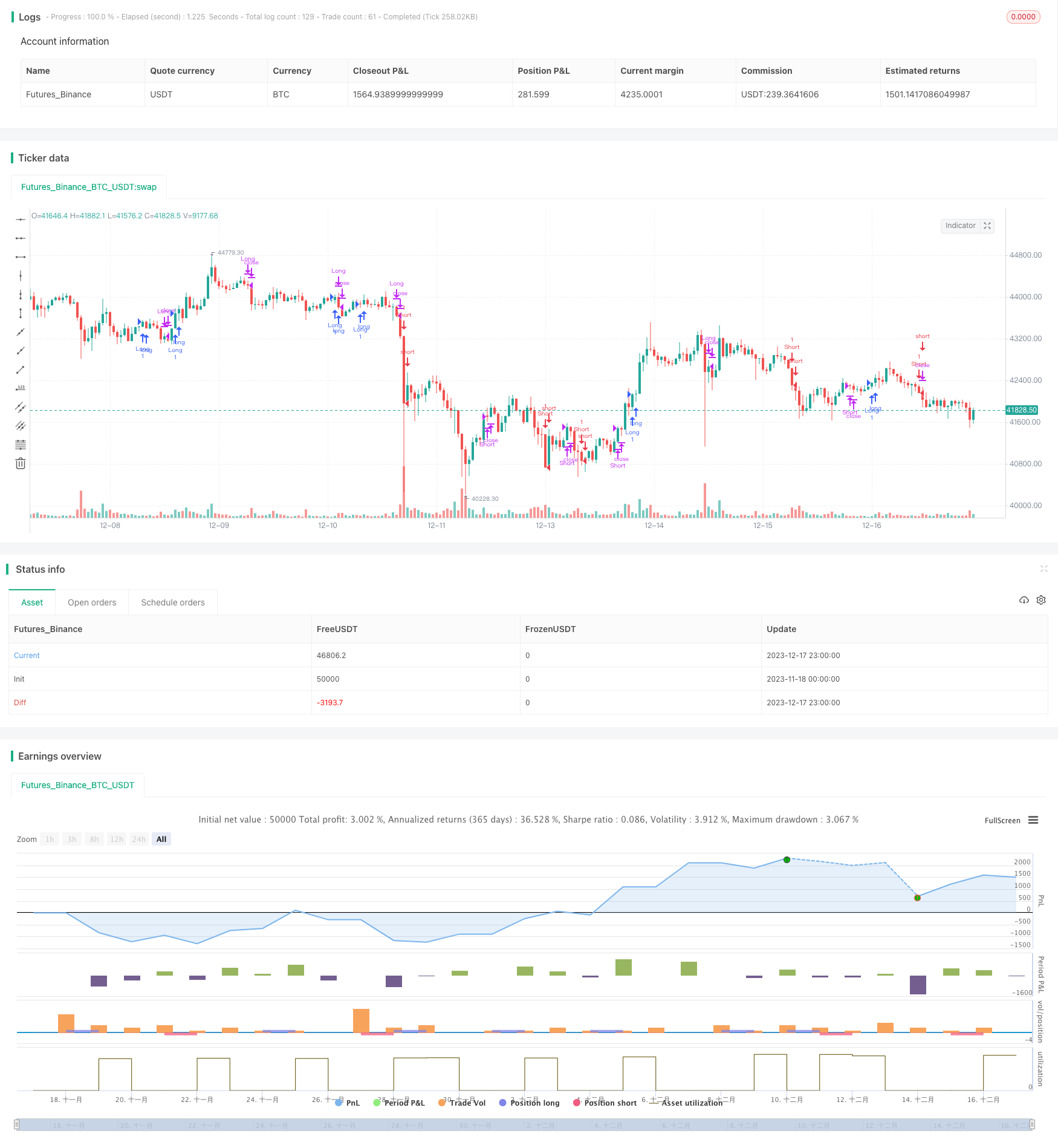
概述
MACD趋势追踪短线策略是一个结合移动平均线、MACD指标和威廉指标的短线交易策略。该策略运用三种指标的不同组合,形成多空仓位的进入和退出条件,以捕捉短线价格的趋势性特征。
策略原理
该策略的主要交易逻辑基于以下几点:
当价格上穿Exponential Moving Average(EMA)均线时看多,当价格下穿时看空;
当MACD的快线高于慢线时看多,当快线低于慢线时看空;
威廉指标的快速移动平均线高于慢速移动平均线时看多,反之看空;
结合这三种情况的组合条件判断入场;
在反向情况下判断出场。
通过EMA判断大趋势方向和MACD判断短期价格动能的组合,该策略可在不错的入场点捕捉价格的趋势特征,从而获利。而威廉指标则可用来进一步验证品种的超买超卖情况,避免假突破。
策略优势
这种多指标组合结构是一个典型的短线趋势追踪策略,主要具有以下几点优势:
三种指标互相验证,可减少假信号的概率;
EMA判断主趋势方向,MACD判断短线动能强弱;
威廉指标避免在剧烈波动中追高杀跌;
反向指标组合判断退出,跟风险控制紧密结合。
策略风险
该策略也存在以下主要风险:
多指标组合结构复杂,参数调优难度较大;
短线操作频繁,交易成本可能较高;
无法正确判断真正趋势反转点,存在亏损风险。
对策主要在参数调优和止损方面,寻找最佳参数组合,并设定合适的止损水平,控制单笔交易最大损失。
策略优化方向
该策略主要可从以下几个方面进行优化:
测试更多指标参数组合,寻找最优参数;
加入更多数据源,如成交量等辅助判断;
设定动态止损或跟踪止损加强风险控制;
结合机器学习模型判断真正趋势反转点。
总结
MACD趋势追踪短线策略综合运用多种指标的优势,在判断短线趋势的同时控制风险。通过参数优化、止损水平设定以及更多数据源的引入,能进一步提高策略胜率与盈利水平。该策略思路值得进一步拓展与深入研究。
策略源码
/*backtest
start: 2023-11-18 00:00:00
end: 2023-12-18 00:00:00
period: 1h
basePeriod: 15m
exchanges: [{"eid":"Futures_Binance","currency":"BTC_USDT"}]
*/
// This source code is subject to the terms of the Mozilla Public License 2.0 at https://mozilla.org/MPL/2.0/
// © platsn
//@version=5
strategy("MACD Willy Strategy", overlay=true, pyramiding=1, initial_capital=10000)
// ******************** Trade Period **************************************
startY = input(title='Start Year', defval=2011, group = "Trading window")
startM = input.int(title='Start Month', defval=1, minval=1, maxval=12, group = "Trading window")
startD = input.int(title='Start Day', defval=1, minval=1, maxval=31, group = "Trading window")
finishY = input(title='Finish Year', defval=2050, group = "Trading window")
finishM = input.int(title='Finish Month', defval=12, minval=1, maxval=12, group = "Trading window")
finishD = input.int(title='Finish Day', defval=31, minval=1, maxval=31, group = "Trading window")
timestart = timestamp(startY, startM, startD, 00, 00)
timefinish = timestamp(finishY, finishM, finishD, 23, 59)
// t1 = time(timeframe.period, "0945-1545:23456")
// window = time >= timestart and time <= timefinish and t1 ? true : false
// t2 = time(timeframe.period, "0930-1555:23456")
// window2 = time >= timestart and time <= timefinish and t2 ? true : false
leverage = input.float(1, title="Leverage (if applicable)", step=0.1, group = "Trading Options")
reinvest = input.bool(defval=false,title="Reinvest profit", group = "Trading Options")
reinvest_percent = input.float(defval=20, title = "Reinvest percentage", group="Trading Options")
// entry_lookback = input.int(defval=10, title="Lookback period for entry condition", group = "Trading Options")
// -------------------------------------------- Data Source --------------------------------------------
src = input(title="Source", defval=close)
// ***************************************************************************************************** Daily ATR *****************************************************
atrlen = input.int(14, minval=1, title="ATR period", group = "Daily ATR")
iPercent = input.float(5, minval=1, maxval=100, step=0.1, title="% ATR to use for SL / PT", group = "Daily ATR")
percentage = iPercent * 0.01
datr = request.security(syminfo.tickerid, "1D", ta.rma(ta.tr, atrlen))
datrp = datr * percentage
// plot(datr,"Daily ATR")
// plot(datrp, "Daily % ATR")
//*********************************************************** VIX volatility index ****************************************
VIX = request.security("BTC_USDT:swap", timeframe.period, close)
vix_thres = input.float(20.0, "VIX Threshold for entry", step=0.5, group="VIX Volatility Index")
// ************************************************ Volume ******************************************************
vol_len = input(50, 'Volume MA Period')
avg_vol = ta.sma(volume, vol_len)
//-------------------------------------------------------- Moving Average ------------------------------------
emalen1 = input.int(200, minval=1, title='EMA', group= "Moving Averages")
ema1 = ta.ema(src, emalen1)
// ------------------------------------------ MACD ------------------------------------------
// Getting inputs
fast_length = input(title="Fast Length", defval=12)
slow_length = input(title="Slow Length", defval=26)
signal_length = input.int(title="Signal Smoothing", minval = 1, maxval = 50, defval = 9)
sma_source = input.string(title="Oscillator MA Type", defval="EMA", options=["SMA", "EMA"])
sma_signal = input.string(title="Signal Line MA Type", defval="EMA", options=["SMA", "EMA"])
// Plot colors
col_macd = input(#2962FF, "MACD Line ", group="Color Settings", inline="MACD")
col_signal = input(#FF6D00, "Signal Line ", group="Color Settings", inline="Signal")
col_grow_above = input(#26A69A, "Above Grow", group="Histogram", inline="Above")
col_fall_above = input(#B2DFDB, "Fall", group="Histogram", inline="Above")
col_grow_below = input(#FFCDD2, "Below Grow", group="Histogram", inline="Below")
col_fall_below = input(#FF5252, "Fall", group="Histogram", inline="Below")
// Calculating
fast_ma = sma_source == "SMA" ? ta.sma(src, fast_length) : ta.ema(src, fast_length)
slow_ma = sma_source == "SMA" ? ta.sma(src, slow_length) : ta.ema(src, slow_length)
macd = fast_ma - slow_ma
signal = sma_signal == "SMA" ? ta.sma(macd, signal_length) : ta.ema(macd, signal_length)
hist = macd - signal
// ---------------------------------------- William %R --------------------------------------
w_length = input.int(defval=34, minval=1)
w_upper = ta.highest(w_length)
w_lower = ta.lowest(w_length)
w_output = 100 * (close - w_upper) / (w_upper - w_lower)
fast_period = input(defval=5, title='Smoothed %R Length')
slow_period = input(defval=13, title='Slow EMA Length')
w_fast_ma = ta.wma(w_output,fast_period)
w_slow_ma = ta.ema(w_output,slow_period)
// ------------------------------------------------ Entry Conditions ----------------------------------------
L_entry1 = close > ema1 and hist > 0 and w_fast_ma > w_slow_ma
S_entry1 = close < ema1 and hist < 0 and w_fast_ma < w_slow_ma
// -------------------------------------------------- Entry -----------------------------------------------
strategy.initial_capital = 50000
profit = strategy.netprofit
trade_amount = math.floor(strategy.initial_capital*leverage / close)
if strategy.netprofit > 0 and reinvest
trade_amount := math.floor((strategy.initial_capital+(profit*reinvest_percent*0.01))*leverage / close)
else
trade_amount := math.floor(strategy.initial_capital*leverage/ close)
if L_entry1 //and window
strategy.entry("Long", strategy.long, trade_amount)
if S_entry1 //and window
strategy.entry("Short", strategy.short, trade_amount)
// --------------------------------------------------- Exit Conditions -------------------------------------
L_exit1 = hist < 0 and w_fast_ma < w_slow_ma and w_fast_ma < -20
S_exit1 = hist > 0 and w_fast_ma > w_slow_ma and w_fast_ma > -80
// ----------------------------------------------------- Exit ---------------------------------------------
if L_exit1 //and window2
strategy.close("Long")
if S_exit1 //and window2
strategy.close("Short")
// if time(timeframe.period, "1530-1600:23456")
// strategy.close_all()